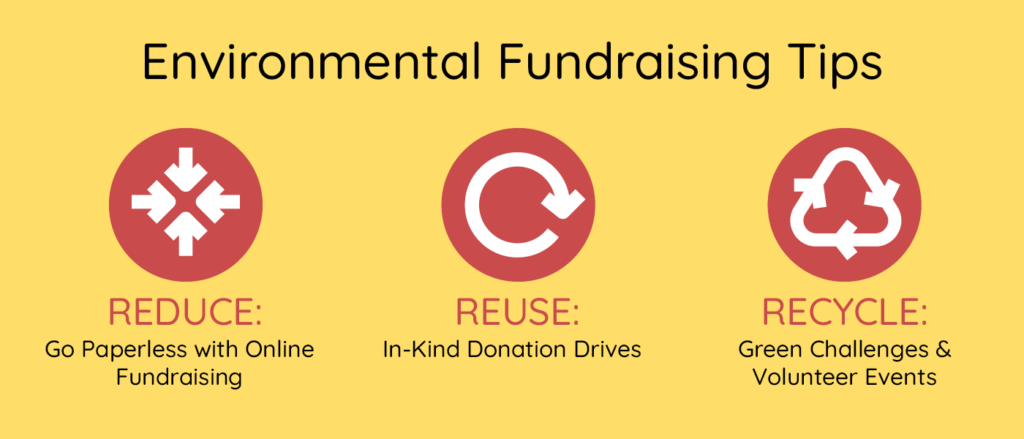Your nonprofit fundraises to further your social good impact, but have you ever considered how your fundraisers impact the environment?
Consider the following ways you can make your operations greener, all while maximizing donations, boosting donor retention, and increasing ROI for your organization:
- Reduce: Go Paperless with Online Fundraising
- Reuse: In-Kind Donation Drives
- Recycle: Green Challenges & Volunteer Events
These simple, forward-thinking strategies will help future-proof your organization. They set you up for long-term success and cement you as a force for good in your community. Are you ready to pursue green giving? Let’s dive in!

Reduce: Go Paperless with Online Fundraising
Online fundraising offers a way to increase revenue while reducing your effect on the environment.
For example, virtual fundraisers eliminate the physical waste and cost of planning and creating in-person events. On top of that, online fundraising campaigns can be easily automated and optimized by software solutions to take the strain off of your team. Here are a few action steps you can take to leverage online fundraising:
- Optimize your website. Employing intuitive navigation menus, mobile optimization, and simplified human-centered design are just a few ways you can improve your website. Look for a user-friendly platform that makes it easy for online visitors to learn about your cause and offer their support.
- Plan a multi-channel digital marketing strategy. Most fundraising teams already utilize email marketing, and it’s no wonder why— studies show that email has the highest ROI of any other marketing channel. Pairing your email marketing with social media, email blasts, and SMS or text invitations can create an even more powerful, paperless, multi-channel marketing approach.
- Invest in fundraising event software. Successfully managing an online fundraising campaign can be challenging. Luckily, event management software can help you plan, host, and track the entire event, whether in-person, hybrid, or virtual. From peer-to-peer campaigns to online auctions, dozens of dedicated or all-in-one event management solutions help you facilitate your next event.
If you choose to host your next fundraiser online, consider how to make the event more engaging for online attendees. For example, you might host live polls, interactive challenges, or auctions to allow your supporters to participate and stay engaged. That way, you can maximize your fundraiser’s revenue and increase donor communication without leaving a substantial environmental footprint.
Reuse: In-Kind Donation Drives
In-kind donation drives involve collecting non-cash contributions like products, supplies, and equipment. They are a great way to repurpose items your donors no longer need, contributing to enhanced global circularity.
To keep valuable, reusable items from ending up in landfills, consider the following easy and accessible in-kind donation drives:
- Shoe drive fundraisers. Who doesn’t have an extra pair of shoes in their closet simply taking up space? Funds2Orgs recommends doing your donors, the planet, and your organization a favor by opening up a donation drive for gently worn, new and used shoes. A shoe drive fundraising coordinator can help plan and manage the event, allowing your team to collect contributions from your community and rehome them while raising money for a worthy cause.
- Clothing and blanket drive fundraisers. Did you know 95% of textiles have the potential to be reused? Plus, specific items like blankets and winter coats are essential for colder regions. Run a clothing drive by collecting gently used clothing from your community and redistributing them to local sellers and thrift stores.
- Food drive fundraisers. Food waste is a rising crisis among developed countries as they dispose of food products in massive quantities. Fight this growing issue, increase revenue, and reduce food insecurity in your community by collecting canned and non-perishable food items and redistributing them to reputable sellers in your local area. Or, run a crowdfunding campaign to support a new sustainable food program.
You don’t always have to ask your supporters for money. Instead, alternative giving campaigns such as in-kind donation drives allow you to make an immediate, direct change to product waste in your area and significantly raise your incoming revenue.
Additionally, consider partnering with corporate sponsors during the holiday season to expand your resources and impact. For example, 360MatchPro highlights Target’s nationwide initiative known as “The Great Giftogether” to provide families in need with donated holiday gifts.
Recycle: Green Challenges & Volunteer Events
In the previous section, we examined how you could turn unwanted and used goods into revenue for your organization. Let’s explore how your team can use garbage and waste to launch creative, engaging recycling campaigns to take things a step further!
Green Challenges
Initiate short-term, competitive fundraising initiatives among your supporters, such as who can donate the most recycled goods. You can bring out a bit of healthy competition and further encourage donors to work towards the success of your event. For example, some eco-friendly initiatives could include:
- Plastic-free pledges. Incentivize your community to decrease their single-use plastic consumption with a plastic-free pledge by offering free donations. Partner with sponsors to choose a predetermined amount they’ll donate for every day a participant upholds their plastic-free pledge and opts for reusable goods instead.
- Sponsored walks, bikes, or runs. Partner with local sponsors such as gyms or running retailers and set an agreed donation amount for them to contribute for every mile your supporters walk, bike, or run. This way, you’ll get your community active, raise funds, and reduce greenhouse gas emissions!
- Peer-to-peer recycling challenges. Social media is great for launching a viral challenge for your supporters. Facebook Groups, in particular, are well-suited to host peer-to-peer recycling challenges. For instance, people could collect one bag of recyclable waste and share a photo, allowing your donors to publicly show their support and expose your campaign to a broader audience.
These are just the beginning of the lucrative fundraising initiatives your organization can launch for its green campaign. Just be sure to plan promotions and let supporters share their green journey. For instance, you might promote a hashtag for your #plasticfreepledge to encourage user-generated content.
Volunteer Events
Volunteers give your most passionate supporters the opportunity to freely and charitably complete significant projects for your organization.
For your green campaigns, create volunteer events that encourage local community members to clean up their parks, public spaces, and towns. These campaigns can be themed and adjusted seasonally for maximum engagement.
For example, a school fundraising version of this event could call for students and parents to gather at locations that need a clean-up crew, such as a badly littered park. You can give these volunteers garbage bags and gloves to collect as much waste as possible, then shuttle them back to your school to reconvene and collect pledges for every bag collected.
These volunteer events not only increase engagement for your supporters, but they expose your brand to the larger community, boosting the possibility of future revenue streams and donor acquisition.
With these straightforward but powerful strategies, you can begin making a stand for ethical and environmental responsibility without draining your resources. You’ll be doing yourself a favor by investing in green solutions that will significantly improve your rates of donor engagement, retention, acquisition, and incoming revenue.
Author: Wayne Elsey is the founder and CEO of Elsey Enterprises (EE) and a member of the Forbes Business Development Council. Among his various independent brands, he is also the founder and CEO of Funds2Orgs, which is a social enterprise that helps schools, churches, nonprofits, individuals and other organizations raise funds while helping to support micro-enterprise (small business) opportunities in developing nations.
